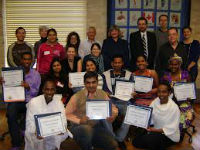
ABOUT CANADA
Is Immigrating to Canada is right for you?
Planning stages for immigrating to another country is a bit confusing about whether or not you want to immigrate to Canada. You (obviously) love the country, and you don't really like the situation you're in now, but there are still a lot of questions...
Planning stages for immigrating to another country is a bit confusing about whether or not you want to immigrate to Canada. You (obviously) love the country, and you don't really like the situation you're in now, but there are still a lot of questions...
| Questions like: | ||||||||||
|
• Do I really want free Health Care for my family? • Free Schooling and Subsidized University tuition. Do my kids need it? • Can I live in a peaceful and accepting multicultural society? • Will I find a job that I like in Canada? • What investment opportunities are available to me? • How much do groceries cost? • How long does it take to immigrate to Canada? |
 |
|||||||||
| They are all very important questions and you shall have the answers to them soon enough. Settlement in Canada Moving to Canada to live permanently is an exciting opportunity but also a great challenge. If you have any questions about live in Canada, education, health care, employment, transportation or housing, find here information on a wide variety of topics. Fast to Canada corp. will provide you with detailed information on each aspect below and is full of great advice for our customers. |
 |
|||||||||
| Arrival: Passport control, customs, procedure of landing as a permanent resident. Housing: Types of apartments, prices, renting. Work: Information, presentation, traditions. Education: Daycare centers, schools, colleges, universities. Transportation: Public transportation, rented cars, obtaining driver’s licences, car purchase or lease, car insurance. Health: Medical services, health card, insurance. |
  |
|||||||||
| Facts about Canada: Canadian Population Facts • The population of Canada as of October 1996 was 30 000 000 (30 million) • The largest city in Canada is Toronto followed by Montreal, Vancoucer, Ottawa-Hull, and Edmonton • 76.6 per cent of Canadians live in cities and towns while 23.4 per cent live in rural areas. • 31 per cent of the population live in the largest cities of Toronto, Montreal and Vancouver • The life expectancy of Canadians is 82 years, which ranks them among the top five countries of the world. So Immigration to Canada not only makes you a Canadian but also improves your life expectancy. • With a population of 32.2 million and a land mass of 9,984,670 km2, each Canadian is able to boast 0.3 km2 of personal space. • The size of the average family is 3.1 people (including 1.3 children) • Multiculturalism (as opposed to the melting pot ideology) was officially recognized in 1988 with the Multiculturalism Act. • Majority of Canadians are Christians 54.2 percent of Canadians are Roman Catholic, other religions in Canada include: Protestantism, Judaism, Islam, Hinduism, Sikhism and Buddhism • In 1991: 16.1 Canadians had a mother tongue of English, 6.5 million had a mother tongue of French (many Canadians had another mother tongue but spoke one or both official languages. • Canada is the world's eighth biggest trader. • Canada, geographically, is the world's second-largest country (almost 10 million km2). • Canada's 37 national parks include Wood Buffalo National Park, which occupies more land than Taiwan or the Netherlands! • Of all of the world's producers of natural gas, copper, zinc, nickel, aluminum, and gold, Canada is in the top five. • Canada has more than 100 national parks and historic sites. |
   |
|||||||||
| Lifestyle Facts • The United Nations has rated Canada as the best country in the world to live in, for seven consecutive years. Immigration is the best way to enjoy your life in Canada. • All Canadian have free access to health care with the exception of dental services. Most people over 65 receive their prescriptions for free. • Canada offers free primary and secondary education. As well post-secondary education is extremely well subsidized and Canada spends more on education than any industrialized nation. • All Canadian have free access to health care with the exception of dental services. Most visits to the hospital are paid by the government. Many employers sponsor additional health insurance plans. Most people over 65 receive their prescriptions for free. |
  |
|||||||||
|
• Canada has an extensive social safety network with old age pensions, family allowance, unemployment insurance and welfare. • Popular sports in Canada include Ice Hockey, swimming, cross-country and alpine skiing, baseball, tennis, basketball, soccer and golf. Many would suggest that the most preferred spectator sports are Ice hockey and Canadian Football. • The average income for families of two persons in Canada is $73,200. Over the six year period, 1996 to 2002, total family income grew by 14%. • Canadians realize that the first years of a child's life are very important. There are government programs to help nursing mothers and babies. In addition, employed mothers get up to 35 weeks of paid maternity leave. |
||||||||||
 How can you ease your settlement in Canada?: How can you ease your settlement in Canada?: You have prepared the proper immigration forms and received your entry visas to live in Canada, but how do you prepare for what you will face when you arrive?Our Settle section aims to provide you with the tools, resources, and information needed to ensure your successful integration into Canadian society and the Canadian workforce. This information will help you make key decisions and address some of the following questions:
We have designed our content to allow you to easily take advantage of the experience that we've gained over the years by working closely with individuals and families coming to Canada for the first time. We have also developed partnerships with a number of public and private sector institutions and organisations with many years of experience in assisting newcomers to Canada. |
|
|||||||||



